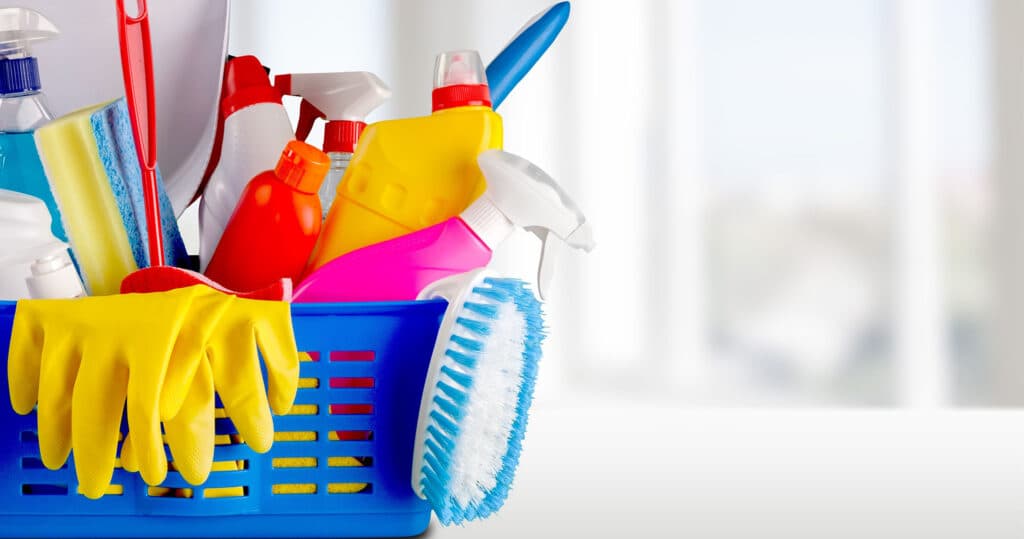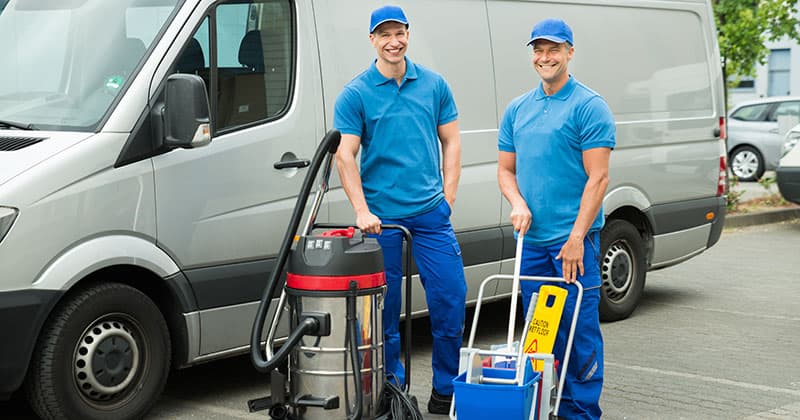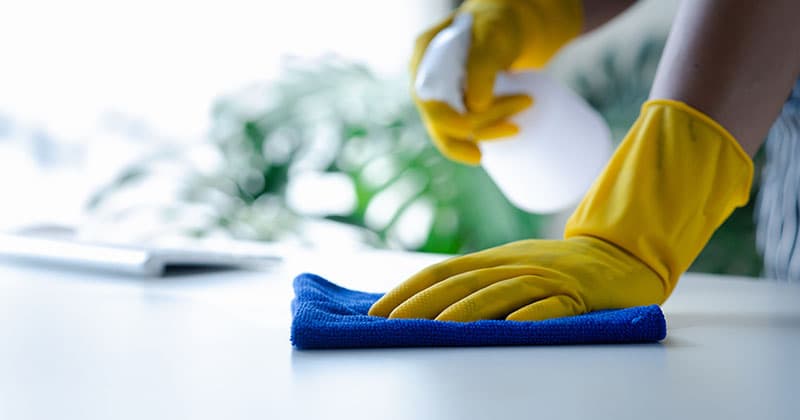
How to Start a Cleaning Business
A cleaning business is one of the easiest ventures to get into. If you want to start a new business in the blue-collar trade, residential or commercial cleaning might be a good choice.
For one, you won’t need much to get started. The startup capital is only a couple of cleaning tools, equipment, and supplies. You don’t even need formal training or qualifications to become a commercial or residential cleaner.
Secondly, cleaning services are always in demand. In North America, cleaning (residential and commercial) is a thriving 159.66-billion-dollar industry. So, cleaning is a secure gig with plenty of room for growth.
Thirdly, you can make good money as a cleaner. Cleaning businesses have relatively low overhead, making for an attractive bottom line. According to ZipRecruiter, the average cleaning business owner pockets about $127,000 annually—that could be you.
Cleaning is a noble and profitable business. The question is where to begin: how to start a house cleaning business or how to start a commercial cleaning business.
Don’t worry, we’ve got that covered.
This article explains how to start a cleaning business (residential vs. commercial). It also prepares you for the challenges of starting a new business.
Read on and learn how to launch a successful commercial or residential cleaning business.
Starting a Residential Cleaning Business vs. a Commercial Cleaning Business
Starting a new business can seem daunting at first, but once you break the process down, it suddenly feels doable. Here’s a simple seven-step guide on how to start your own cleaning business:
1. Know Your Market
The first step to starting any business is understanding your target market. Who are the ideal customers for your cleaning service?
Your target market will, of course, depend on the type of cleaning services you plan to offer.
As a residential cleaner, you’ll mostly target homeowners, residential tenants, and maybe even local realtors. If you choose the commercial cleaning route, you’ll likely be cleaning office buildings, learning institutions, hotels, restaurants, hospitals, etc.
Whichever the case, conduct thorough market research. In addition to analyzing your target customers, the research should answer the following questions:
- Is there a need for my cleaning services?
- Is the cleaning market large enough to sustain a new business?
- What do customers want (or lack) from a cleaning business?
- Who are the potential competitors?
2. Write a Business Plan
Next, draw up a solid business plan. This will be a roadmap for your new cleaning enterprise. A good business plan highlights your business goals and details what must be done to achieve them.
Include these key components in your business plan:
- Business description: Provide a detailed description of the business and what it does. Break down the cleaning services you plan to offer, whether commercial or residential.
- Budget: Calculate how much money you’ll need to get the business up and running. Also, note how you’ll fund the startup.
- Pricing strategy: Develop a profitable and competitive pricing model for your cleaning services.
- Marketing plan: Identify your target customers and how you plan to reach them. Explain how you’ll set your brand apart from other cleaning businesses.
- Financial forecasts: Project how much money you’ll make (and spend) in the foreseeable future.
FROM ONE OF OUR PARTNERS: How to Write a Business Plan with Pricing Samples + Tips
3. Register Your Cleaning Business
Choose a name and business structure for your startup and get it registered.
Forming a sole proprietorship is the easiest way to get started as a professional cleaner. However, if you’re looking for something more official, a limited liability company (LLC) is the way to go. An LLC is an independent legal entity, meaning your personal and business liabilities/assets are separate.
To register an LLC, you must file an LLC operating agreement and articles of organization with your local Secretary of State or business bureau. You’ll also need an Employer Identification Number (EIN) for tax purposes.
4. Get a Business License
You’ll need a business license to operate any type of cleaning business. For a small commercial or residential cleaning business, you’ll likely only require a general business license. This is issued by the state, city, county, or municipality where the business operates.
However, you may need additional permits depending on the cleaning services you offer and your location. For example, some municipalities require residential cleaners to carry a home occupation permit. As a commercial cleaner, you may require specialized permits to handle hazardous materials such as medical and chemical waste.
Check with the local authorities about properly licensing your cleaning business.
5. Insure Your Business
It’s always a good idea to protect a new business against unforeseen risks and losses. Take out a comprehensive business owner policy that sufficiently covers all plausible threats to your business’s assets, income, and interests. Insurance is especially useful for commercial cleaners.
6. Stock Up on Cleaning Supplies and Equipment
With the paperwork out of the way, it’s time to stock up. Get all the necessary supplies, tools, equipment, and gear for cleaning jobs.
Depending on what you do, your cleaning toolkit might have the following items:
- Protective gear (gloves, gowns, masks, goggles, boots, etc.)
- Cleaning tools (mops, brooms, dusters, brushes, etc.)
- Power tools (vacuum cleaner, floor buffer, pressure washer, etc.)
- Inventory (soaps/detergents, disinfectants, trash bags, air fresheners, and specialized cleaners)
- Cleaning business management software (for all your admin and management needs)

7. Get the Word Out
Once you have everything set up, your business is ready to hit the market. It’s time to start reaching out to potential clients and telling them about your new cleaning business. Combine various marketing strategies to spread the word about your business and convince people to hire you.
Market your cleaning business using these proven methods:
- Develop and launch a branded website for your cleaning business
- Claim your Google Business Profile
- Create social media accounts and grow your social following
- Email potential clients with personalized promotional messages
- Hand out pamphlets and flyers in your local area
- Create a referral program to drive recommendations
- Join hands with other local businesses in the home services or sanitation industries

How Much Money do You Need to Start a Cleaning Business (Residential & Commercial)?
Starting any new business costs quite a bit of money. As the saying goes, “You have to spend money to make money.”
You’re probably wondering by now, “Exactly how much money do I need to start a cleaning business?”
Well, the final figure can vary widely depending on a myriad of factors. For example, setting up a commercial cleaning business can be more expensive than starting a home-based cleaning service. Also, the scale or size of the enterprise will greatly influence your startup costs.
Here’s a breakdown of the three main costs you should keep in mind as a first-time entrepreneur:
Cost of Equipment
Cleaning equipment can set you back anywhere from a couple of hundred dollars to a few thousand dollars. This expenditure generally depends on where your focus is—residential or commercial cleaning.
Residential cleaning implements are relatively inexpensive. Something like $500 can get a decent toolkit with a wide selection of hand tools like brushes, brooms, and mops. You don’t need that much protection either; an apron, a pair of gloves, and rubber boots will do.
Commercial cleaning, on the other hand, requires costlier gear, tools, and supplies. We’re talking heavy-duty vacuum cleaners, drill-powered scrubbers, floor buffers, pressure washers, and the like. On top of that, commercial cleaners have to wear full PPE when working in some facilities.
Cost of Teams
If you plan to hire workers, wages and employee benefits are major costs to consider. If you hire a professional cleaner, for example, you can expect to pay them somewhere between $32,000 and $52,000 per year.
Labor costs will depend on your team’s size and the roles you want to fill. A word of advice: keep payroll as small as possible. Only hire extra workers when it’s absolutely necessary.
In fact, rather than retaining a permanent crew, you can hire cleaners on a contractual basis. This strategy will serve you well, especially during your business’s infancy.
Cost of Software
Another way to cut labor costs is by automating some of your business operations. For example, you can automate payments and bookkeeping, eliminating the need for a costly accountant.
However, such software comes at a cost. Some of them can go for thousands of dollars a month. But not all business management solutions are that expensive. The trick is shopping around for an affordable digital tool with all the features and capabilities your business needs.
Speaking of capable yet affordable software, Kickserv is a great choice. At a low point of entry, you have a variety of different pricing packages that include a CRM, estimating tools, and a payment processor. It’s a fitting software solution for any cleaning startup.
Challenges New Cleaning Business Owners Face
Starting a new business is exciting. It’s about building something of your own, realizing a dream, and being your own boss. While thrilling and fulfilling, venturing into business is no walk in the park.
Let’s discuss some challenges you might face as a new entrepreneur and how to solve them.
Cash Flow Issues
Did you know that nearly half of all startups fail within the first five years? And as it turns out, most small businesses fail due to cash flow problems. These are problems like:
- Running out of capital
- Delayed payments
- Poor financial management
- Bad investment decisions
- Unrealistic financial projections
- Loose grip on business expenditure
Keep your cash flow green by starting off with enough funds to see the venture through. Crucially, stay on top of your income and spending through systematic bookkeeping. Also, operate the business within its means—do not overextend a young business.
RELATED ARTICLE: Managing Your Finances as a Home Service Business Owner
Fierce Competition
The US is home to over 360,000 residential cleaning businesses. We have even more commercial cleaners, with the number exceeding 1.2 million. Whichever route you take, you’ll undoubtedly face some competition as a new cleaning service provider.
Competing in the cleaning industry is a game of wits. Outdo your competitors by offering customers services, perks, or experiences they can’t get from other cleaners. Brand your business around a unique selling point.
Staffing Woes
Finding dependable workers can be challenging. Although cleaning roles don’t require any formal qualifications, you can’t just hire anyone. You want a crew you can rely on not only to do a good job but also to uphold professional discretion and work ethic.
Keep an open mind when it comes to hiring cleaning professionals. Try various talent sources, including third-party recruiters and labor marketplaces. Also, devise a quick training program to onboard new hires.
Regulatory Compliance
In addition to local regulations like zoning and HOA laws, home cleaning businesses may have to comply with various regulations and standards.
Depending on the cleaning or janitorial services you offer, you may be required to comply with standards/laws such as:
- Occupational Safety and Health Administration (OSHA) labor laws
- Hazard Communication standards (1910.1200)
- EPA’s guidance for cleaning and disinfecting
- ISSA’s Cleaning Industry Management Standard (CIMS)
There are no two ways about compliance. Check and meet all the requirements needed to comply with the mandated laws or standards.
RELATED ARTICLE: Navigating Legal Issues as a Home Service Business Owner
Harmonizing Work-Life Balance
The demands of running a new business can sometimes be overwhelming. Cleaning business owners often have to wear many hats, work long hours, and make hard decisions. All these responsibilities can slowly creep into your personal life, robbing you of valuable socializing, family, or self-care time.
Find a sustainable way to balance your work and personal life. You could do so by delegating some of your responsibilities and prioritizing your well-being and personal goals.

Keys to Success
Starting a new business can be a dream come true. However, being an entrepreneur takes guts and determination. And the reality is, success is not always guaranteed.
There’s no single answer to succeeding in business. But here’s what you can do to boost your odds of success:
- Focus on your goals from the very start
- Keep detailed records
- Learn from your competitors
- Be flexible, agile, and creative
- Provide excellent customer service
- Be patient, persistent, and consistent
- Hire the right people
- Track expenses and keep costs low
- Leverage technology
How Kickserv Can Help Jump-Start Your Business
There you have it. Everything you need to know about how to start a cleaning service business. But let’s circle back to business management software. We left one question unanswered.
What sort of software do you need to run a cleaning business?
The Power of Field Service Management Software
Field service management (FSM) software is a digital platform designed to manage business activities in the field. It streamlines operations by digitizing and automating various business aspects such as:
- Scheduling and dispatching
- Client management
- Bookkeeping
- Billing and invoicing
- Financial management
- Documentation and reporting
- Crew management
- Business performance analytics
- Payment processing
This is the ideal software for a cleaning business. Using FSM software improves your business’s efficiency and productivity. It also helps you make informed business decisions.
Digitization saves you money and time too. With FSM software, you don’t need to hire a manager to oversee day-to-day activities. The software saves you from tedious, time-consuming, and potentially erroneous manual administration work.
RELATED ARTICLE: What Is Field Service Management
Try Kickserv for Free
Automate your field operations with Kickserv. This all-in-one FSM platform has everything you need to manage your new cleaning business. Enjoy powerful features, including automated scheduling, recordkeeping, detailed analytics, and third-party integration. What’s more, you can customize Kickserv to meet your unique needs.
Try Kickserv for free today and discover a stress-free way to start, run, and grow your cleaning business.
Never miss a post.
Get notified of new content